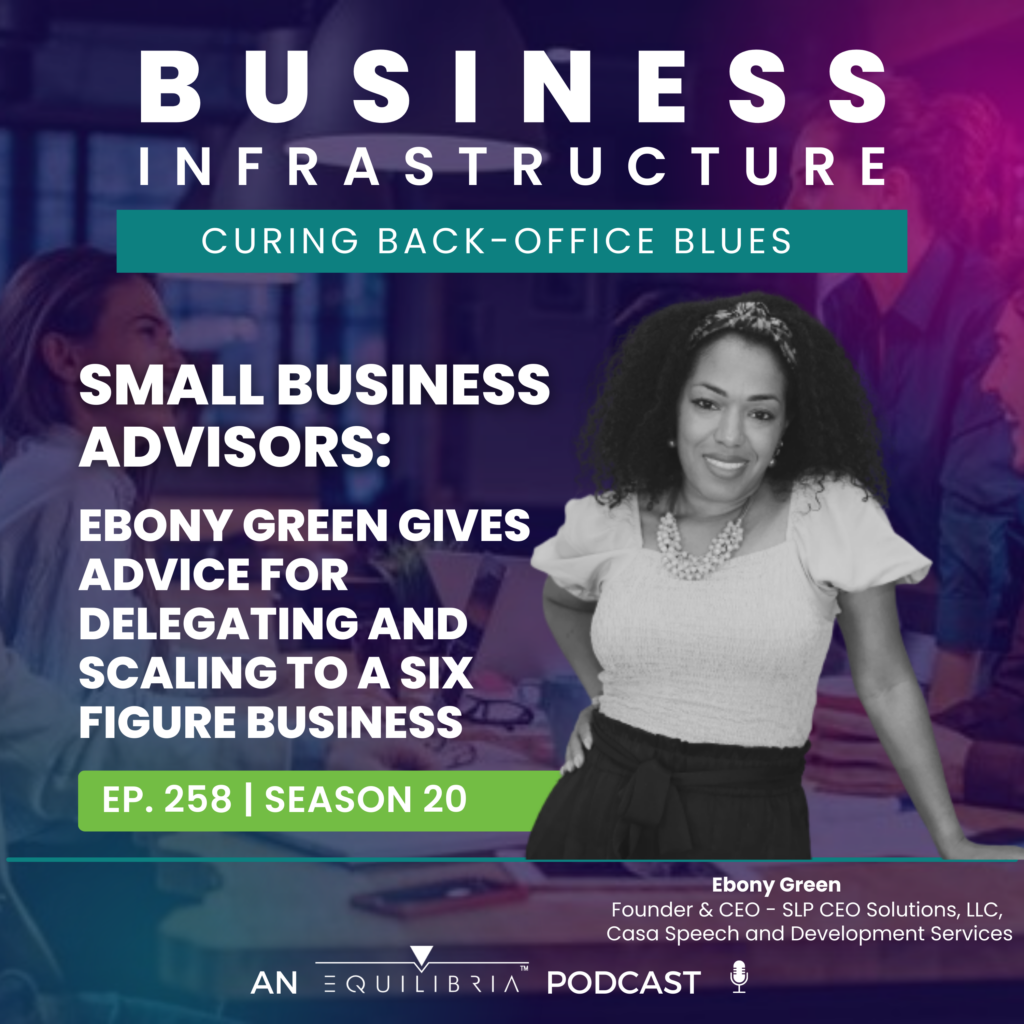Transcript
This episode is underwritten by Equilibria, Inc. the company behind this podcast where we design scale-ready business infrastructure for fast-growing small businesses. 
The world is filled with examples of successful business growth. As entrepreneurs, it’s up to us to remain receptive to learning the lessons offered through those examples, even if the business is different from ours.
This is Season 20 on the Business Infrastructure podcast – the show where we share operational tips, strategies, and tactics to help you cure any back-office blues you might be experiencing. I’m Alicia Butler Pierre and this season features 12 small business advisors, each with a unique skillset they’ll share with you.
It’s easy, and frankly, lazy, to assume that because someone’s business is different from ours that we can’t learn anything from their successes. It’s just not true! This is what retrofitting is all about – taking best practices from one field or industry and applying it to another. So with that in mind, pay close attention to our featured advisor in this episode. Although she specializes in speech language pathology, trust me, there’s so much value to gain from listening to her and acting on her advice.
This is Episode 258– Ebony Green Gives Advice for Delegating and Scaling to a Six-Figure Business.
My name is Ebony Green, and I am located in the Phoenix area, and I am the CEO of CASA Speech and Development Services, a pediatric speech and OT clinic. I’m also the owner and CEO of the SLP Business Suite, which is an online learning platform for speech-language pathologists. I am originally from Texas. I grew up in Austin, so Austin is very, unique, in comparison to a lot of other cities in Texas.

I had the pleasure of meeting Ebony at a Podcast Movement Evolutions conference held in Las Vegas in March of 2023. When she told me that she specializes in helping other speech-language pathologists scale their private practices, I knew I had to invite her onto the show. When you’re at conferences you naturally ask people where they are from. And that’s when I learned that although Ebony lives in Phoenix, Arizona she’s originally from Austin, Texas. In case you didn’t know, Austin has been touted as the Silicon Valley of the Southwest.
There’re so many tech companies moving out there. The real estate market has changed quite a bit. So, it’s one of the booming cities for sure. And I can see why – the nice weather, the food, and the live music scene in Austin are amazing. So, it’s definitely a great place to move.
Texas also borders Mexico which made me ask if this had anything to do with Ebony’s career starting as an educator teaching Spanish.

So, I am bilingual. I speak both English and Spanish. I’m not Latina. I don’t come from a background or origin in Latin America. But I come from a background of being raised by a single parent who was also an immigrant. And so, my mother is from Central America, and she’s from the only country in Central America where they speak English.
And so, people often think that because of my Central American background that’s why I’m bilingual. It’s actually due to the fact that we always surrounded ourselves with other people from diverse backgrounds. And the family friends that I was around the most, they all spoke Spanish. And so I kind of picked up on the language very young and just continued to study Spanish in school.
I won awards in school for, the national Spanish exam, and it was just always something that I was really passionate about learning, not just the language, but, being immersed in the culture and being around all of my friends from Latin America and eating their foods and learning how to dance to the different types of music that they had.
And this love of, and immersion into, Latino culture led her to her first job as a teacher. That opportunity came right after she graduated from the University of Texas at Austin with a degree in Communications and Media Studies.
I immediately wanted to help the bilingual population because there was such a need for bilingual teachers. And with me having near-native proficiency in Spanish, I was like, I have to use this gift. And so, I taught second grade and third grade. And in Texas, grades K through four are taught all in Spanish if the child comes from a Spanish-speaking family.
So, I taught just like a normal, traditional classroom teacher would teach, you know, math, science, reading, writing. I taught all of those subjects in Spanish. And one of the biggest benefits of my doing that was that I became even more confident and even more skilled in speaking Spanish as a second language. And so, I ended up taking a position at a high school to teach Spanish language to high schoolers. enrich the lives of these young children who I was teaching, these young adults, and really show them that you don’t have to be from a certain background to be able to be fully bilingual and, that we should use these gifts to help others.

Belize is the English-speaking country in Latin America that Ebony mentioned earlier. And although her family’s roots are there, Ebony grew up loving languages and exploring other cultures. In fact, it played a huge role in her decision to pursue a degree in communications.
I saw communication as a means to be able to do something related to business, but also, communication and language. I decided I wanted to go into teaching because I really had a heart for teaching other people and giving back. And even today, I still teach. I teach people how to scale their businesses and how to start their own private practices.
Later I decided to continue working in a school setting, but I want to see if I can really help the students that I had who were struggling the most. And those students were the ones that were receiving special education services. They were receiving speech therapy; they were receiving occupational therapy. And so, I talked to the speech therapist at the school where I worked. And she
mentioned how there was such a need for speech-language pathologists and also bilingual speech-language pathologists. That was really what piqued my interest in communication sciences and disorders.
But Ebony didn’t stop there. She decided she would become a speech pathologist. And that required an advanced degree.
Before I was in grad school, I started working in the field as an assistant and worked for a few years and then went to graduate school. And the entire time I was studying, to become a speech-language pathologist.
Once Ebony began working as a speech-language pathologist, she would one day start her first company. I wondered how long she worked before she started CASA Speech and Development Services.
It was about five or six years. I’d worked in different settings. One of the unique things about speech-language pathology is that we serve the lifespan. We serve infants in the NICU who have trouble with breathing and swallowing. We also serve school-aged children, young adults, and adults, and we serve geriatric patients who may have had a stroke, who need remediation with their speech, or who may have had some sort of traumatic brain injury and need, speech remediation or even with their swallowing.
Because we serve the lifespan, I was able to get some experience doing a little bit of work working with school children, working with younger children, and working with adults. And so, getting all of that experience really kind of helped me hone in on exactly what I wanted to do. And, in addition to serving the lifespan, we also work in a variety of settings. So we work in the school setting, we work in the hospital setting, and we also work in private clinics. And so having had that experience as well showed me that I really enjoyed two settings – and that was the schools and working in a clinic or private practice.
Knowing this made it easy for Ebony to figure out what the focus of CASA Speech and Development Services would be. But I was curious – how did her nudge to start a business begin? Where did it come from?
Well, I did something that I hardly ever do, and that was, I, I decided to quit my job working at the schools. That was kind of the culminating event that really pushed me forward, in terms of starting my private practice. The reason I quit my job was because I was at a school that was growing very quickly there. It started out with just maybe 40 to 50 students that needed speech therapy, and I was part-time. So, for part-time, three days a week, 40 to 50 students are manageable.
Well, that number grew to close to a hundred students, in just a couple of months. With me being a part-time employee and having a full-time caseload, the workload was pretty much impossible for me to get everything that needed to be done in just three days a week. Unfortunately, the school didn’t have the budget to hire a full-time person, so their expectation was kind of for me to fit everything into the three days, and it just wasn’t possible. So, I decided to quit, and I immediately figured out that I could probably start a private practice and make more money than I was making working at the school, and I could go back into the schools, but I could do it as a contractor. So that was a huge benefit for me as well.
And once Ebony started her private practice, she didn’t look back. The year was 2019 when she officially started CASA Speech and Development Services. They’ve experienced phenomenal growth ever since, quickly becoming a six-figure business. How’d she do it? Well, it turns out business infrastructure played a huge role. Coming up after the break, Ebony will tell us all about this and more.

How do you know if your business is growing faster than you can keep up with? If you have trouble keeping up with things like deliveries and projects. Your customers are angry, team turnover is high, and the complaints are piling up. Where can you go for relief? How can you save your business from the chaos of unmanageable, fast growth?
It might be time to build business infrastructure. Business infrastructure is a system for linking the people, processes, tools, and technologies that act as the heartbeat of your back-office operations. It gives your fast-growing small business a stable foundation to not only continue growing but to scale in a profitable, sustainable, and repeatable way.
That’s why if you want a business that can consistently operate without your daily presence, then the Smooth Operator course is for you. It’s an online introductory course on business infrastructure that can provide you with proven tools, tactics, and techniques to calm the chaos and restore order. Go to SmoothOperator.courses to learn more. That’s SmoothOperator.courses.
We’re back and before the commercial break, Ebony Green took us along her career journey from teacher to speech-language pathologist to Founder & CEO of her own company. Her company, CASA Speech, and Development Services has enjoyed fast, but manageable growth. So, how’d she do it? How did she build a company and successfully scale it so quickly?
She credits some of it with business infrastructure. Business infrastructure links the people, processes, and tools of your company to scale in a repeatable, profitable, and sustainable way. For Ebony, building business infrastructure started with the people element, specifically delegation. Listen as she explains.

I will say that a big part of delegation is choosing the right people. And when I realized that I needed to hire, it was when I could no longer make the demands of the referrals that I was getting. So, I decided I need to hire someone. And I wanted to choose someone that had not only the skills to do the type of therapy that I was doing.
But I also wanted to make sure that they had experience and that, you know, they were going to do just as good a job at providing the services as I would, as the therapist that was treating these kids that I was seeing.
That was kind of the first step was deciding I can no longer meet the demands of the job that I have. And in order for me to grow, I have to hire, I have to expand, right? I know it’s cliche, but I had to duplicate myself. And that meant choosing the right person to take on the role of being a therapist for my company, and me being able to transfer some of those patients over to this new therapist so that I can either get more patients or focus on strategically growing the business.
In other words, Ebony had to make a conscious decision to transition from being an owner/operator to a CEO. It also meant leveraging business infrastructure as a foundation for hiring back-office support. But as Ebony found out, verbalizing the need to delegate is one thing, but actually doing it…well, that’s another.
I hired my first office assistant probably six months in. I just kept hiring therapists that could take on, the requests that we were getting for therapy, and I was managing all of the inquiries, the website. I was calling people back when they would call us to ask if we had therapists available. And so, my plan was just to get as many, patients assigned to therapists as possible, so that, you know, we can continue to grow. therapists are revenue-producing members of my team.
So, for me, hiring a revenue-producing team member was a lot less scary than hiring someone who was going to be doing admin, but not necessarily producing the revenue that a therapist was producing. So, once I got comfortable with the idea of having that help from an administrator or administrative team member, who’s not going to be producing that therapist revenue, that’s when I
decided to hire my first office assistant.
At that point, I had maybe about five to six therapists. And so, I felt like we were making enough from the therapist revenue that was coming in to be able to cover the cost initially of hiring an administrative assistant.
And once she hired that administrative assistant, something happened that Ebony did not expect. She went into it thinking this person would be a non-revenue-producing team member. But as she discovered – this person’s work led to more streamlined back office operations. This freed up the capacity and capability for the business to take on even more patients, which meant more revenue!
I started to see that this administrative assistant was able to get us even more clients in much faster. so having this administrative assistant allowed me to just focus on seeing my clients, we got a contract with the school district around that time, so I was able to fully focus on serving that school district, which was a huge additional source of revenue for the company.
Ebony’s story embodies one of my mantras – you must let go in order to grow. And she’s right, letting go and delegating is scary. There’s a lot at stake. Your reputation, credibility, and money are all on the line. This brings us to the importance of having the other elements of business infrastructure in place – processes and tools.

We definitely try to operate as much as we can in a paperless office environment. With us having patient files and things like that, the first thing that I did was, I got an electronic medical records software to help me manage all of our medical records rather than having them in file cabinets having an electronic medical records system allows my team to be able to access records, to be
able to create schedules all in one place.
When we were first starting out as a company, we had to learn how to use the software. We had to teach therapists how to use it, but once we got that established, it just made everything so much easier. The moment someone calls, the first thing we could do is we could open that EMR up and we can look at which therapists are available.
If you own a healthcare practice, some smaller practices, they start out doing everything on pen and paper, and I just can’t imagine, you know, with the amount of information that we have to access every day, how much more of a challenge that is. The second thing that we started implementing was using a platform called Google Workspace. We use that for everything. For our meetings, for the documents that we have to create and share amongst the group, everything is in our Google Drive and Google Workspace.
Even when I started out, and it was just me and a couple of other therapists, I adopted that very early on because I didn’t want to have documented all in different places and have to email them back and forth. We want to be able to make changes to things in real time and have updated versions of our documents available to everyone, just by sharing it with a link. So those are two of the things that we started very early on, and they’ve helped tremendously with continuity and consistency across the team.
Now, regarding delegation, who do you typically delegate to document some of these key processes and maybe some standard operating procedures that you all have in place? You’re in the healthcare field, I would imagine there are all kinds of forms, paperwork, checklists, templates. Who do you delegate the management of all of that too in general?
So, I’m going, to be honest, initially, I was doing all of that. I was the person trying to document everybody’s jobs, everyone’s procedures. And then I realized that I can’t do all of this, and they know the procedures and the processes so they can help document this. And so, now I have a VP of operations. I have a home and community-based services coordinator and parent advocate.

I have a director of clinical operations, and I have an office manager. So, the four of them, each sit down and document, their different procedures, and different workflows, for their specific departments. They take ownership of those if they need to be updated or if any changes need to recur. I stepped away from doing it for everybody and kind of delegated that to the different
department heads.
I’m smiling Ebony, because you said two titles that are like music to my ears, VP of operations and director of clinical operations. Going from that mindset of, revenue-generating staff versus nonrevenue-generating staff. I love the fact that you have a balance now and that there’s that fundamental understanding of the value that all of these people bring to your team. I know we have to start wrapping up here, but I’m wondering, do you have any general advice for small business owners that also may be experiencing that fast, rapid growth that you were talking about when it comes to delegation?
Yes. I would say definitely learn how to trust. You have to learn how to trust people, because I struggled with being able to trust others, and it took me a long time to delegate some of the things that I should have been delegating, even when I had team members in place that could take on these additional tasks, I was holding onto them because I didn’t trust that they would do it a certain way or do it as I would. So, being able to have trust in your team is going to help your business grow tremendously, and it’s really going to allow you to delegate and move things off of your plate so you can focus on other things. So definitely trust your team.
The other piece of advice is to communicate constantly with your team because a lot of times when things don’t go the way that we plan or someone doesn’t do something up to our expectations, it’s usually due to not having clearly communicated expectations. So even when we delegate, we still need to communicate in order to make sure that those expectations are met and to make sure that
the people on our team have the right resources that they need to complete the task that we delegate to them.
And a well-designed infrastructure and delegation can streamline your operations. It can increase efficiency. It can allow your business to grow, but that doesn’t happen if you just completely remove yourself from the equation. You have to communicate, you have to do those checks and balances.
I communicate with my team daily. I’m not always in the office every single day, but we communicate daily. And if there are days where I’m not communicating with them, I’m getting some sort of report, I’m getting some sort of feedback from other members of my team about the deliverables that people are working on or kind of what I need to be in the know about in the business.
What Ebony just described is her ability to work on her business and not in her business. This is what the popular business book, The E-Myth, is all about. Turns out Ebony is also a fan of this book and she has some other resources to share for scaling your small business.
Yes, the E-Myth it’s one of my favorite business books. I’m glad that you mentioned that. if you were to ask me to recommend a business book to someone, I would definitely tell them to read The EMyth, because it really changed my mindset about delegation and having a team-led company. but as far as my personal resources that I offer, I offer to coach and offer courses to speech-language pathologists or people who are in the speech pathology, OT, or PT industry and are looking to start their own private practice. my resources are really for scaling and delegating.
There are some people who focus on kind of the beginner, like starting a business, you know, writing a business plan. I don’t really cater to that audience necessarily, but I’m really there to help those who, have started their business and they want to grow, but they don’t know what’s next.
Someone who maybe has a few employees and now they’re like, “I don’t know who I need to hire next.” When do I hire that administrative assistant? Or when do I let go of some of my patients and give them to someone else? So that’s kind of where I focus my teaching and coaching services.

The name of my platform is the SLP Business Suite. S-L-P as in Speech Language Pathologist. And I have courses on my website. I also have opportunities for people to sign up for one-on-one coaching. And then I have a podcast. It’s the SLP Business podcast, again, S-L-P like Speech Language Pathologist. The SLP Business podcast covers various topics surrounding business and private practice ownership.
Those are two of the things that I’ve been doing since the pandemic because a lot of private practice owners were struggling to keep their doors open. And, I thought, what better time than now to maybe teach them some business strategies to scale because the pandemic was actually one of my biggest growth years due to the number of diversified income streams, and I was able to bring it to my business.
And here’s something else you should know…Ebony has also grown the SLP Business Suite into a separate six-figure business leveraging many of the techniques she’s shared here. So, even if you aren’t a speech-language pathologist or you don’t own a private practice in healthcare you can definitely learn from Ebony on what it takes to build, grow, and successfully scale a fast-growing small business.
I would just sum it up by saying that investing in your business infrastructure and investing in a solid team is really investing in the long-term growth of your business. You want to make sure that you do the work early on and then you start to delegate, and you start to trust people to take things off your plate. And eventually, hiring that non-revenue-producing team member is going to pay off.
Well, Ebony, I’m so glad we were able to make this interview happen, and I appreciate you so much for taking the time to speak with me today.
Thank you so much for having me. Just thinking back to when we first met a couple of months ago and now getting to be on your podcast is just so amazing. I’m so glad that we met and thank you for this opportunity.

Thank you so much for listening! If you enjoyed this episode, then subscribe to the show and leave a five-star rating, and review wherever you’re listening.




















